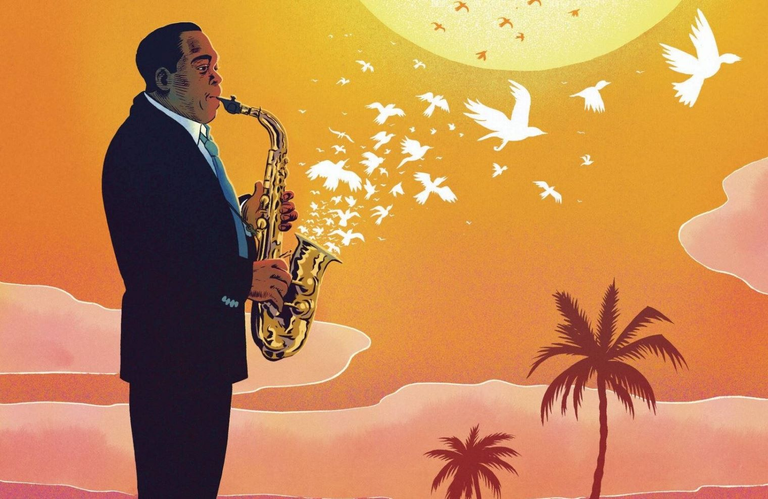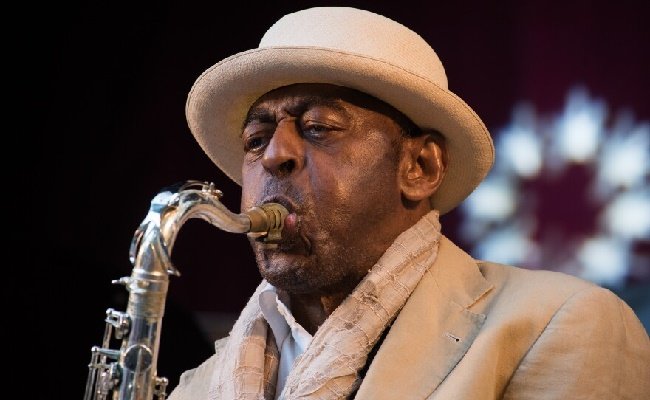ESP
El jazz tiene uno de sus principales exponentes en el músico estadounidense Charlie Parker, quien muriera el 12 de marzo de 1955. Parker fue un renovador del jazz; introdujo el estilo bebop, donde también destacaron Dizzy Gillespie, Bud Powell y Thelonious Monk. Uno de los más reconocidos saxofonistas, particularmente en el saxofón alto, en lo que resalto por su dominio de la improvisación, aspecto tan característico del jazz.
“Bird” (“Pájaro”), como se le apodara, tuvo una vida de mucha intensidad, marcada por el consumo de alcohol y heroína, que le ocasionó eventos graves de salud. Estuvo hospitalizado varias veces e intentó suicidarse en dos oportunidades. Su muerte ocurrió en un hotel de Nueva York a la edad de 35 años. Póstumamente, sus grabaciones pasaron al Salón de la Fama de los Grammy, y recibió honores del Servicio Postal y de la Biblioteca del Congreso de Estados Unidos.
ENG
Jazz has one of its main exponents in the American musician Charlie Parker, who died on March 12, 1955. Parker was a jazz renovator; he introduced the bebop style, which also featured Dizzy Gillespie, Bud Powell and Thelonious Monk. One of the most renowned saxophonists, particularly on the alto saxophone, in which he stood out for his mastery of improvisation, an aspect so characteristic of jazz.
"Bird", as he was nicknamed, had a very intense life, marked by alcohol and heroin consumption, which caused him serious health problems. He was hospitalized several times and attempted suicide on two occasions. His death occurred in a New York hotel at the age of 35. Posthumously, his recordings were inducted into the Grammy Hall of Fame, and he received honors from the U.S. Postal Service and the Library of Congress.

Charlie Parker ha sido motivo de inspiración y tema en la literatura y el cine. La llamada “generación beat” estadounidense, fundamentalmente Jack Kerouac, rindió homenaje al músico en su prosa narrativa y poética. En 1959 grabó un disco titulado Poesía de la Generación Beat con el pianista Steve Allen, donde se incluye “Charlie Parker”, que pueden escuchar en inglés en este enlace.
En el mismo año el escritor argentino y universal Julio Cortázar le dedica uno de sus más famosos cuentos: “El perseguidor”, incluido en su libro Las armas secretas, texto al cual nos referiremos.
También cabe destacar, entre las muchas manifestaciones artísticas dedicadas a Parker, el filme Bird, de 1988, realizado por el director Clint Eastwood, del cual pueden ver este trailer.
Charlie Parker has been a source of inspiration and subject matter in literature and film. The so-called American "beat generation", mainly Jack Kerouac, paid tribute to the musician in his narrative and poetic prose. In 1959 he recorded an album entitled Poetry of the Beat Generation with pianist Steve Allen, which includes "Charlie Parker", which you can listen to in English at this link.
In the same year the Argentine and universal writer Julio Cortázar dedicates one of his most famous stories to him: "The persuer", included in his book The secret weapons, text to which we will refer.
It is also worth mentioning, among the many artistic manifestations dedicated to Parker, the 1988 film Bird, made by director Clint Eastwood, of which you can see this trailer.
“El perseguidor”, ese excelente cuento de Cortázar, recrea los últimos años de la vida de Charlie Parker, quien aparece bajo el nombre ficcional de Johnny Carter, desde la óptica de un periodista y crítico amigo, Bruno, personaje también ficticio. En la historia, que transcurre sobre todo en París, marcada por los triunfos y sinsabores de Parker, Cortázar introduce una reflexión de gran trascendencia acerca del tiempo, presente en la conciencia atormentada del músico y expresada en magníficos monólogos del músico o comentarios del narrador-periodista. Trataré de reproducir algunos fragmentos de ese tema central del cuento.
Nadie sabe ya cuántos instrumentos lleva perdidos, empeñados o rotos. Y en todos ellos tocaba como yo creo que solamente un dios puede tocar un saxo alto, suponiendo que hayan renunciado a las liras y a las flautas.
He visto pocos hombres tan preocupados por todo lo que se refiere al tiempo. Es una manía, la peor de sus manías, que son tantas. (…) Me he acordado de un ensayo antes de una grabación, en Cincinnati, y esto era mucho antes de venir a París, en el cuarenta y nueve o cincuenta. Johnny estaba en gran forma en esos días, y yo había ido al ensayo nada más para escucharlo a él y también a Miles Davis. (…) Y justamente en ese momento, cuando Johnny estaba como perdido en su alegría, de golpe dejó de tocar y soltándole un puñetazo a no sé quién dijo: “Esto lo estoy tocando mañana” (…) y Johnny se golpeaba la frente y repetía. “Esto ya lo toqué mañana, es horrible, Miles, esto ya lo toqué mañana”.
Cuando el maestro me consiguió un saxo que te hubieras muerto de risa si lo ves, entonces creo que me di cuenta en seguida. La música me sacaba del tiempo, aunque no es más que una manera de decirlo. Si quieres saber lo que realmente siento, yo creo que la música me metía al tiempo.
"The pursuer", that excellent story by Cortázar, recreates the last years of Charlie Parker's life, who appears under the fictional name of Johnny Carter, from the point of view of a journalist and critic friend, Bruno, also a fictional character. In the story, which takes place mainly in Paris, marked by Parker's triumphs and sorrows, Cortázar introduces a reflection of great transcendence about time, present in the tormented conscience of the musician and expressed in magnificent monologues by the musician or comments by the narrator-journalist. I will try to reproduce some fragments of this central theme of the story.
Nobody knows anymore how many instruments he has lost, pawned or broken. And on all of them he played as I believe only a god can play an alto saxophone, assuming they have given up lyres and flutes.
I have seen few men so preoccupied with everything that concerns the weather. It is a mania, the worst of his manias, of which there are so many. (...) I remembered a rehearsal before a recording, in Cincinnati, and this was long before coming to Paris, in forty-nine or fifty. Johnny was in great shape in those days, and I had gone to the rehearsal just to listen to him and also to Miles Davis (...) And just at that moment, when Johnny was like lost in his joy, he suddenly stopped playing and throwing a fist at I don't know who he said: "I'm playing this tomorrow" (...) and Johnny hit his forehead and repeated. "This I'm playing tomorrow, it's horrible, Miles, this I'm playing tomorrow".
When the maestro got me a saxophone that you would have died laughing if you saw it, then I think I realized it right away. Music took me out of time, although that's just a figure of speech. If you want to know what I really feel, I think music took me out of time.

Son tantas las posibilidades de acercamiento a este extraordinario cuento de Cortázar –la dura vida del personaje y sus relaciones amorosas, el jazz y sus tribulaciones, la experiencias cotidianas en el metro, etc.–, pero decidimos centrarnos en la cuestión del tiempo, que, lejos de una meditación extrafísica, constituye la reflexión acerca de la trascendencia que puede tener la música (precisaría, la buena música, y me perdonan) al trastocar los tiempos de nuestra subjetividad, como siente Johnny Carter, y permitirnos conectarnos con una experiencia otra.
There are so many possibilities for approaching this extraordinary story by Cortázar -the hard life of the character and his love affairs, jazz and its tribulations, the daily experiences in the subway, etc.-, but we decided to focus on the question of time, which, far from an extraphysical meditation, constitutes a reflection on the transcendence that music (I would specify, good music, and forgive me) can have by disrupting the times of our subjectivity, as Johnny Carter feels, and allowing us to connect with another experience.
Referencias | References:
Cortázar, Julio (1982). La isla a mediodía y otros relatos. España: Salvat editores.
https://es.wikipedia.org/wiki/Charlie_Parker
https://en.wikipedia.org/wiki/Charlie_Parker
Pueden leer en los enlaces siguientes el original del cuento en español y la versión en inglés.| You can read the Spanish original and the English version in the following links.
https://www.ucm.es/data/cont/docs/119-2014-02-19-Cortazar.ElPerseguidor.pdf
https://www.researchgate.net/file.PostFileLoader.html?id=561ad9935e9d97952e8b45a7&assetKey=AS%3A283487987879937%401444600211831

Gracias por su lectura | Thank you for reading.





The rewards earned on this comment will go directly to the people sharing the post on Twitter as long as they are registered with @poshtoken. Sign up at https://hiveposh.com.
Saludos, poeta. Me deleité con su excelente exposición de Cortázar y Charlie Parker, en su relato “El Perseguidor”. Es aleccionador y gratificante.
Gracias por tu visita y valoración, @camborio. Qué bueno que te gustó. Saludos.
Hermoso relato que junta mágicamente a mi escritor favorito y al músico favorito de mi padre!!
Agradecido por tu lectura y valoración, estimada @caracasprin. Saludos.